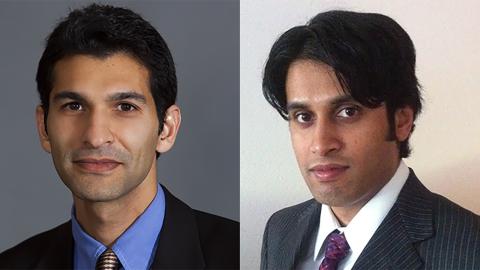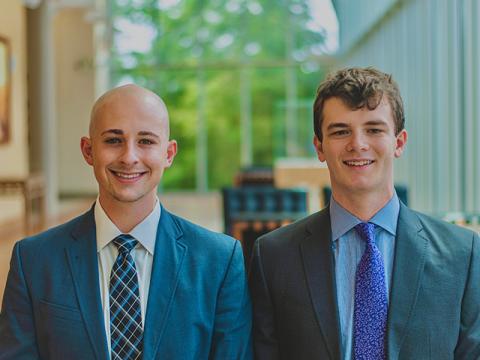Tulane graduates selected for National Science Foundation Innovation Corps program

Alexander B. Simon and Alexander D. Wise, both recent graduates from Tulane’s chemical and biomolecular engineering program, participated in the National Science Foundation Innovation Corps, or NSF I-Corps, program this past summer.
Their team, Articular Solutions, included Noshir Pesika, chemical and biomolecular engineering associate professor, who served as the technical lead and Shafin Khan, licensing associate at Tulane’s Office of Technology Transfer, who mentored the team.
The aim of the NSF I-Corps program is to provide researchers the opportunity to build upon fundamental research in a manner that facilitates the development of technologies, products, and processes to benefit society.
 Noshir Pesika, chemical and biomolecular engineering associate professor, who served as the technical lead and Shafin Khan, licensing associate at Tulane’s Office of Technology Transfer, who mentored the team.
Noshir Pesika, chemical and biomolecular engineering associate professor, who served as the technical lead and Shafin Khan, licensing associate at Tulane’s Office of Technology Transfer, who mentored the team.
The NSF I-Corps award provided the team the opportunity to perform customer discovery research by interviewing potential clients, industry professionals, and other stakeholders to ensure that the team’s product will provide unmet market needs. The team is developing an artificial biomimetic knee meniscus that would provide young patients with meniscus injuries an alternative to a total knee replacement.
“Performing high-impact athletic activities puts young patients with previous meniscus surgeries at the risk of needing a total knee replacement within five to 10 years of their original surgery,” Simon said.
“This is not an issue for older patients; however, young and active patients are forced to drastically adapt their lifestyle to accommodate their damaged knees,” Wise said.
Aside from reducing activity, there is no available solution to bridge the gap between meniscectomies and total knee replacements in a young active patient.
“Our artificial meniscus is inspired by the lubrication mechanism of natural articular cartilage. In the presence of an aqueous fluid, such as synovial fluid, the polymer-based artificial meniscus provides similar lubricity to natural cartilage,” Pesika said.
Simon and Wise will continue to work in the Pesika Lab to develop a minimum viable product with the goal to eventually build a startup company around their technology.

